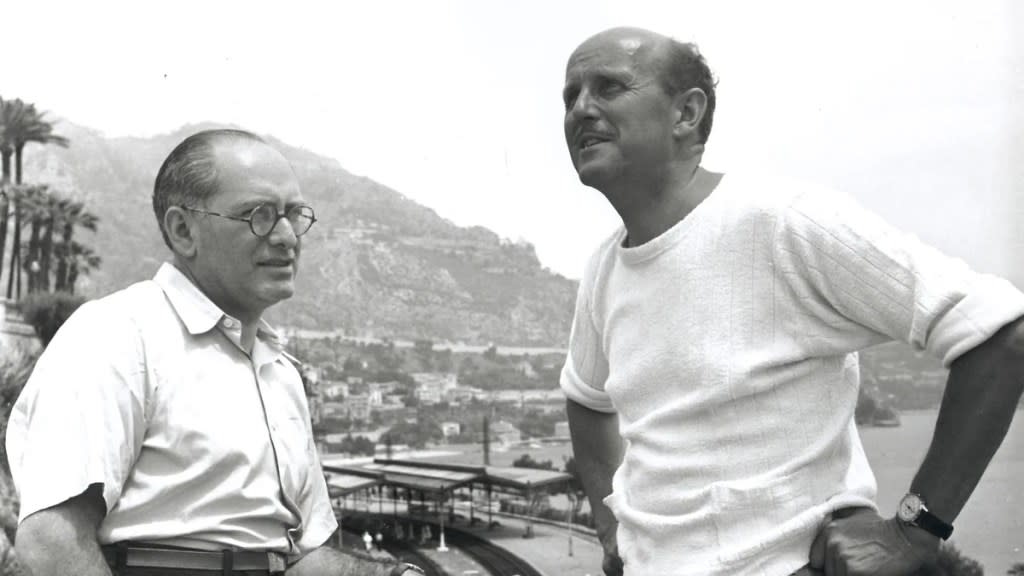‘Made in England: The Films of Powell and Pressburger’ Review: Martin Scorsese-Led Doc Gets Personal

- Oops!Something went wrong.Please try again later.
- Oops!Something went wrong.Please try again later.
Martin Scorsese’s voiceover narration and on-camera presence foregrounds the personal nature of “Made in England: The Films of Powell and Pressburger,” an irresistible documentary survey about the formative movies of mid-century British writer/director Michael Powell and his co-writer Emeric Pressburger.
Scorsese didn’t direct “Made in England,” but his insights and relationship with Powell and Pressburger’s movies serve as the clothesline that director David Hinton hangs his movie’s footage on, including clips from both his title subjects’ movies as well as some charming archival interview footage (both Powell and Pressburger are now dead). Even Hinton’s tendency of focusing on Powell over Pressburger makes sense when you consider Scorsese’s presence as the lightly held lens through which the movie presents formative Powell and Pressburger dramas like “The Life and Death of Colonel Blimp,” “The Red Shoes,” and “The Tales of Hoffmann.”
“Made in England” begins and ends with Scorsese’s relationship to Powell, in particular, from seeing “Thief of Bagdad” — co-directed in 1940 by Powell and two others — on TV as a child to later becoming friendly with Powell, the husband to Scorsese’s longtime editor Thelma Schoonmaker (who, along with Scorsese, is credited as an executive producer on the doc). The title of “Made in England” therefore shouldn’t be misread as a promise to relate the inherent British-ness of either Powell and Pressburger or their movies, but rather to show how an American cinephile with “no cultural baggage” (in Scorsese’s words) saw what many English moviegoers and producers didn’t immediately appreciate.
Hinton understandably focuses on Scorsese’s analysis of Powell and Pressburger’s work. Clips from more than a dozen movies help to illustrate Scorsese’s talking points about not only the types of “tortured” characters he’s drawn to in these movies, but the virtuosic and surreal cinematic techniques that distinguished now-revered movies like “A Matter of Life and Death” and “Black Narcissus.” Scorsese’s narration also provides a clear understanding of the filmmakers’ priorities, particularly Powell’s desire to remain creatively independent as well as his and Pressburger’s mutual respect and admiration.
Scorsese’s eye for closely read details and his knack for informative, unpretentious descriptions are the main attraction in “Made in England.” He mostly focuses on the ways that Powell and Pressburger used the creative freedom afforded to them by working with (usually) sympathetic collaborators like producer Alexander Korda and distributor/production studio the Rank Organisation.
Scorsese also mainly discusses Powell and Pressburger’s personalities through their creative decisions in everything from the rousing 1941 war drama “The 49th Parallel” to Powell’s formerly infamous 1960 serial killer psychodrama “Peeping Tom.” A personal connection is further established, but not over-emphasized when Scorsese suggests that many couples have declared their love for each other by watching Powell and Pressburger’s 1945 romantic-drama “I Know Where I’m Going,” as Scorsese did with an unspecified partner.
With that said, “Made in England: The Films of Powell and Pressburger” would only be so interesting if Scorsese wasn’t such a gifted film historian. His interpretation focuses on his understanding of Powell and Pressburger’s creative decisions, which Hinton and his editors perfectly illustrate using images, scenes, and behind the scenes footage of Powell and Pressburger’s collaborations. Even initiated fans will likely be won over and informed by Scorsese’s analysis, like when he positions a ten-minute dialogue-free sequence in the stunning 1947 convent drama “Black Narcissus” as not only an expression of Pressburger’s understanding of cinema as a portmanteau art form, as well as provides specific information on how Powell achieved that effect by letting music, rather than dialogue take the lead (the music was first composed and then played on set for the on-camera performers).
Scorsese’s warm and insightful presentation often makes it easy to overlook Hinton’s tendency to focus more on Powell than Pressburger’s creative decisions. It still might have added something to “Made in England” if we were told more about the novels that Pressburger wrote after he and Powell stopped making movies together, or why Pressburger supposedly took Korda’s side when, after the Cannes Film Festival premiere of “The Tales of Hoffmann,” Korda thought that movie’s third act should be re-edited.
Then again, ancillary interview footage with Powell and Pressburger emphasizes the filmmakers’ combination of self-effacing reserve and lightly held self-assurance, like when Powell answers an interviewer who asks how he feels about being underappreciated in his home country. “When has England ever appreciated its great men,” Powell answers rhetorically. Then, after a pause, Pressburger suggests that they should cut after that somewhat grandiose and partly tongue-in-cheek comment.
You don’t need to jump to too many conclusions to see the creative and personal connections between the haunting conclusion of the 1948 ballet romance “The Red Shoes,” and both Powell’s personality — “I would do it myself,” he said, when asked why it was important to show an artist dying for their art — and Scorsese’s, like when he recalls Powell’s consoling presence during the making of Scorsese’s 1982 black comedy “The King of Comedy,” which was produced during a low point in his career.
“Made in England: The Films of Powell and Pressburger” isn’t just an incisive history lesson, but also a revealing correspondence between two generations of master filmmakers.
“Made in England” will be distributed in the US by Cohen Media Group and Turner Classic Movies.
The post ‘Made in England: The Films of Powell and Pressburger’ Review: Martin Scorsese-Led Doc Gets Personal appeared first on TheWrap.

